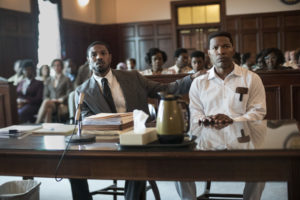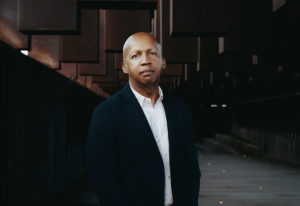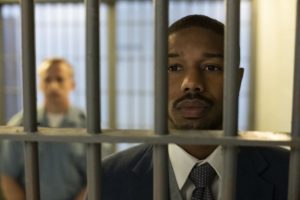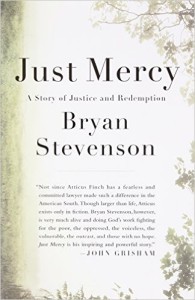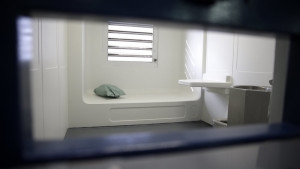Just Mercy
“Inspire to change.” See this.
January 11, 2020“I believe that hopelessness is the enemy of justice.”
-Bryan Stevenson
WBUR/TONYA MOSLEY
Michael B. Jordan (left) as Bryan Stevenson and Jame Foxx as Walter McMillian in “Just Mercy.”
(Photo by Jake Giles Netter/Warner Bros. Pictures)
Bryan Stevenson: “Many people, most people in this country don’t want there to be inequality and injustice. They don’t want people to be treated unfairly or cruelly. I just think if you get closer to it, you’ll be motivated to say more, to do more. I do hope people that see this film will walk away with a greater consciousness about why we need to do better in this country when it comes to creating a justice system that is fair and reliable.”
On addressing racist legacies, which have contributed to nearly 42% of death row inmates being black
“I think we do have to begin talking more honestly about our history of racial injustice. I don’t think our country has ever engaged in any meaningful process of acknowledging the injustice, the inequality. I think we’re a post-genocide society. What we did to Native people was a genocide, and we haven’t acknowledged that. And we’ve allowed systems to continue that have been compromised by these narratives of racial difference. I think the great evil of slavery was involuntary servitude. It was this idea that black people aren’t as good as white people. And that continues after the 13th Amendment. That’s why I’ve argued slavery doesn’t end, it just evolves, and we had 100 years of terrorism and lynching and violence where black people were pulled out of their homes and beaten and murdered and drowned and tortured and lynched. And we’ve never really talked about that. And even though we pay more attention to the civil rights era, we haven’t confronted the fact that this presumption of dangerousness and guilt that gets assigned to black and brown people is still with us. It’s why these police encounters with young black people that end up with lethal violence are so disruptive and so painful.”
“The great gift I have is that I am the great grandson of people who were enslaved and they believed in freedom when it wasn’t rational to. And I’m the grandchild of people who were terrorized by lynching and they believed in a better future, even though that didn’t seem logical. I’m the child of people humiliated by segregation and Jim Crow, and yet they believed I could be anything I want. And it’s that orientation of hopefulness that has sustained me. We say in the film and I say when I give talks, ‘I believe that hopelessness is the enemy of justice.’ If you want to do justice work, you have to be prepared to believe things you haven’t seen. And it’s what continues to define the work I try to do today.”
‘Do people deserve to die for the crimes they’ve committed?’ I think the threshold question is, ‘Do we deserve to kill?’”
This 60 Minutes piece is referenced and recreated in the film, “Just Mercy.” Then correspondent Ed Bradley interviewed Bryan Stevenson and others about Johnny D…Walter McMillian…aired on November 22, 1992.
The True Story Behind “Just Mercy”.
On September 19, 1988, Judge Robert E. Lee Key, Jr., the first presiding judge (Yes, his real name) overruled the jury’s recommendation of a life sentence and imposed the death penalty.
Bryan Stevenson and Walter McMillian remained friends until Walter’s death in 2013. He died after he developed dementia believed to have been brought on by the trauma of imprisonment. [From Stevenson, Bryan (2014). Just Mercy: A Story of Justice and Redemption. New York: Spiegel & Grau. p. 368.].
Dialogue for Criminal Justice Reform
July 27, 2015Equal Justice Initiative
“Seeking justice for all treatment…”
slate.com
John Oliver, ‘Last Week Tonight’:
‘Mandatory minimum sentences can send Americans to prison for decades for even low-level drug offenses—regardless of context—as John Oliver explained on Sunday’s episode of Last Week Tonight. Even the judges who are forced to issue these sentences often think they’re egregiously unfair.
So why do we have them? Most mandatory minimum sentencing laws were written during the height of the crack epidemic in the 1980s and ’90s, when politicians from both sides of the aisle raced to outdo each other when it came to being “tough on drugs.” Though the policies were immensely popular, almost everyone agrees they were a mistake, and what’s worse, they’ve contributed to the United States’ insane incarceration rate.’
Mother Jones
http://www.motherjones.com/politics/2015/07/sandra-bland-bail-bond-system
“The large companies behind many local bondsmen are part of the American Bail Coalition, a powerful national association that has spent three decades pushing legislation that makes it harder for defendants like Bland to get out of jail without paying large sums of money. Before ABC began lobbying, in 1990, commercial bail accounted for just 23 percent of pretrial releases; today it’s 49 percent. Average bail amounts for felony cases have almost tripled in the past 25 years. Meanwhile, between 2004 and 2012, ABC companies whose income comes almost entirely from bail saw their revenues increase 21 percent.”
NPR
“About 1,000 people die in American jails (not prisons) every year, and about a third of those are suicides.”
http://www.npr.org/2015/07/27/426742309/the-shock-of-confinement-the-grim-reality-of-suicide-in-jail
